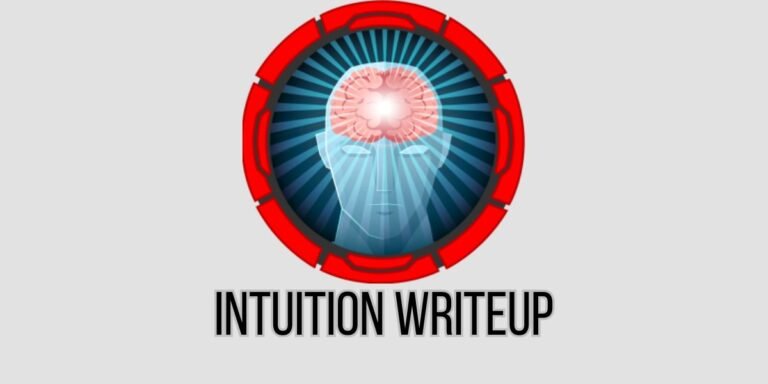What is Intuition?
Intuition is often described as a gut feeling or an instinctive understanding of a situation without the need for conscious reasoning. It’s that internal voice guiding decisions, sometimes referred to as our sixth sense. While science may categorize Intuition Writeup as an unconscious integration of experiences and knowledge, many people regard it as a profound inner wisdom. This phenomenon has captivated thinkers, psychologists, and everyday individuals alike.
The Psychology Behind Intuition
Intuition is deeply rooted in our psychological makeup. Cognitive psychology suggests that our brains constantly process information, even when we aren’t consciously aware of it. This processing can lead to intuitive insights based on past experiences and learned knowledge. The brain can make rapid assessments using heuristics—mental shortcuts that help in decision-making.
The Dual-Process Theory
The dual-process theory, proposed by psychologists, illustrates two modes of thinking: the analytical and the intuitive. The analytical process involves logical reasoning and conscious thought, while the intuitive process is fast, automatic, and often emotional. Understanding this dichotomy can help individuals recognize when to trust their intuition over analytical thinking.
Types of Intuition
Intuition can manifest in various forms, each serving different purposes in our lives.
Emotional Intuition
Emotional intuition involves understanding and interpreting feelings, both in ourselves and others. This type of intuition can enhance empathy, allowing us to connect with people on a deeper level. It helps us gauge moods, understand social dynamics, and navigate interpersonal relationships effectively.
Creative Intuition
Creative intuition refers to the ability to generate new ideas and innovative solutions. Artists, writers, and innovators often rely on this form of intuition to inspire their work. It’s that moment of clarity when inspiration strikes unexpectedly, leading to groundbreaking creativity.
Analytical Intuition
Analytical intuition combines experience and expertise, often seen in professionals who make quick, informed decisions in their fields. For instance, a seasoned doctor may intuitively diagnose a patient’s condition based on subtle cues that may not be immediately apparent.
The Role of Intuition in Decision-Making
Intuition plays a significant role in how we make decisions, influencing choices in both personal and professional realms. Trusting your gut can lead to more authentic and satisfying outcomes, especially when time is of the essence.
Advantages of Intuitive Decision-Making
- Speed: Intuition allows for rapid decision-making, crucial in fast-paced environments.
- Creativity: It can inspire innovative solutions that analytical thinking might overlook.
- Authenticity: Following your instincts often leads to more genuine choices that align with personal values.
Challenges of Intuitive Decision-Making
While intuition can be beneficial, it also comes with challenges. Relying solely on gut feelings can lead to biases or misinterpretations. It’s essential to balance intuition with analytical reasoning to ensure well-rounded decision-making.
Cultivating Intuition
Developing your intuitive skills can enhance your ability to make decisions and connect with your inner self. Here are some strategies to cultivate intuition:
Mindfulness Practices
Engaging in mindfulness activities, such as meditation or deep breathing, can help clear mental clutter, allowing intuitive thoughts to surface. By being present in the moment, you become more attuned to your inner voice.
Journaling
Keeping a journal can help track your intuitive insights over time. Writing down thoughts, feelings, and gut reactions can reveal patterns, making it easier to recognize and trust your intuition.
Trusting Your Gut
Learning to listen to your instincts is crucial. Pay attention to your body’s signals and how they align with your feelings and thoughts. Over time, you’ll become more adept at recognizing when to trust your intuition.
The Science of Intuition
Researchers have explored the biological and neurological foundations of intuition. Studies show that intuitive thinking engages specific areas of the brain associated with emotions, memories, and decision-making.
Neurological Insights
The amygdala, a part of the brain involved in emotional processing, plays a vital role in intuitive reactions. When faced with a decision, the amygdala quickly assesses emotional cues and can influence our gut feelings.
The Role of Experience
Experience enhances intuition. Professionals in various fields develop intuitive skills over time, as repeated exposure to situations allows them to recognize patterns and make quicker, more informed decisions.
Intuition in Everyday Life
Intuition is not just a psychological phenomenon; it permeates everyday life, influencing our choices and interactions. From personal relationships to professional settings, intuition can guide us in various situations.
Relationships
In personal relationships, intuition helps navigate emotional landscapes. It enables us to sense when something is off or when a partner may need support, fostering deeper connections and understanding.
Career Decisions
In the workplace, intuition can aid in career choices, project management, and team dynamics. Trusting your instincts when evaluating job offers or team members can lead to more fulfilling work experiences.
Conclusion
Intuition is a powerful tool that can enhance decision-making, creativity, and interpersonal connections. By understanding its psychological roots and learning to cultivate intuitive skills, individuals can tap into their inner wisdom and navigate life’s complexities with greater ease. Balancing intuition with analytical thought leads to more informed and authentic choices, enriching both personal and professional experiences.
FAQs
What is intuition?
Intuition is the ability to understand something instinctively, without the need for conscious reasoning.
Can intuition be developed?
Yes, intuition can be cultivated through mindfulness practices, journaling, and trusting your instincts.
How does intuition impact decision-making?
Intuition allows for rapid and authentic decision-making, often enhancing creativity and emotional intelligence.
Is intuition always reliable?
While intuition can be beneficial, it should be balanced with analytical reasoning to avoid biases and misinterpretations.
What are the types of intuition?
There are several types of intuition, including emotional, creative, and analytical intuition, each serving different purposes.

